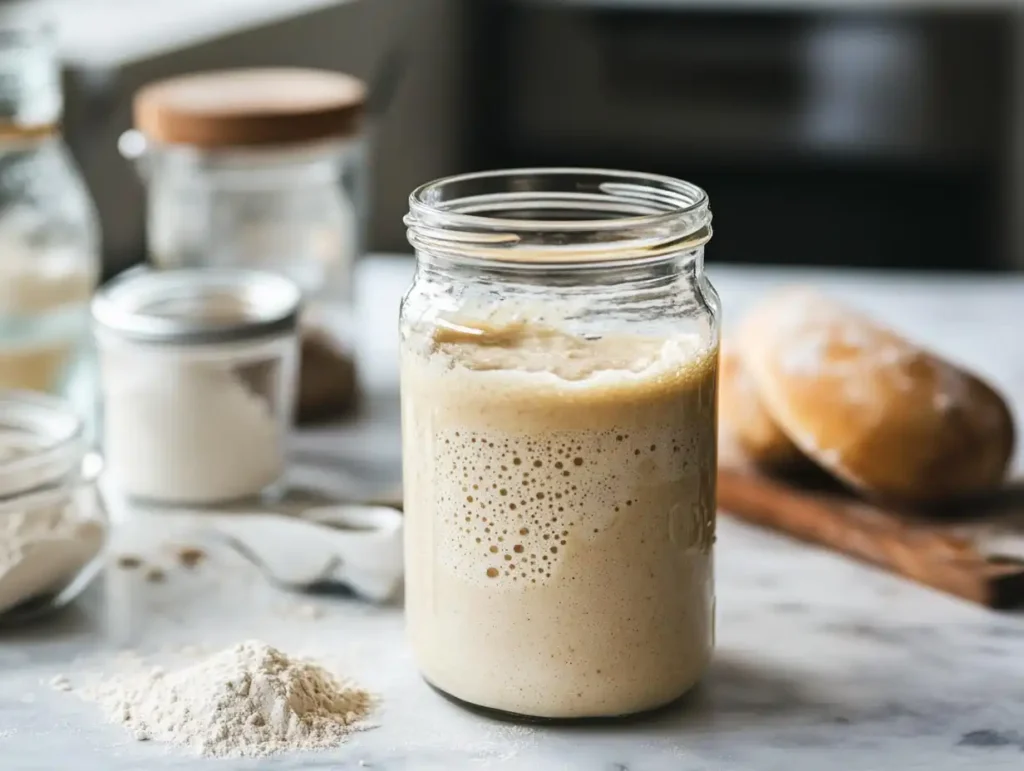Sourdough bread has gained immense popularity in recent years, not just for its rich flavor and chewy texture but also for its health benefits. One of the most intriguing aspects of sourdough bread is its reputation for being less likely to contribute to weight gain compared to other types of bread. But why is sourdough bread not fattening?
The answer lies in its unique preparation process, nutritional profile, and effects on digestion and metabolism. Unlike conventional bread made with commercial yeast, sourdough undergoes a natural fermentation process that enhances its nutritional value and makes it more digestible. Moreover, sourdough bread has a lower glycemic index (GI), meaning it doesn’t cause the rapid blood sugar spikes that can lead to fat storage.
This article delves into the science and nutritional properties of sourdough bread to uncover why it’s a healthier option for weight-conscious individuals. From its gut-friendly benefits to its ability to keep you fuller for longer, we’ll explore every aspect of what makes sourdough unique and beneficial for maintaining a healthy lifestyle.
Table of Contents
What Makes Sourdough Unique?

History of Sourdough Bread
Sourdough bread is one of the oldest types of leavened bread. Ancient Egyptians were the first to make it thousands of years ago. They used natural fermentation to create bread with a light texture. Over time, this technique spread worldwide. Unlike modern bread, sourdough uses wild yeast and bacteria, giving it a tangy flavor and chewy feel.
Understanding the Fermentation Process
Fermentation is what makes sourdough special. During this process, wild yeast and bacteria feed on the flour’s carbohydrates. This creates carbon dioxide, which helps the bread rise, and lactic acid, which adds its sour taste. Fermentation also breaks down phytic acid, improving the bread’s nutrient absorption.
Comparison with Regular Bread
Sourdough and regular bread differ in many ways. Regular bread uses commercial yeast, which works fast. Sourdough relies on natural fermentation, which takes more time but makes the bread healthier and easier to digest. It also has a lower glycemic index and less gluten, making it a better option for health-conscious people.
Nutritional Profile of Sourdough Bread
Macronutrient Breakdown
Sourdough bread is rich in carbohydrates but also provides protein and small amounts of fat. A slice has about 120-150 calories, 20-25 grams of carbs, 3-4 grams of protein, and less than 1 gram of fat. The fermentation slows the digestion of carbs, offering steady energy.
Key Vitamins and Minerals
Sourdough bread has several important vitamins and minerals. It provides B vitamins like thiamine and niacin, which help with energy and brain health. The fermentation process also makes minerals like iron, zinc, and magnesium easier for your body to absorb.
The Role of Natural Yeast and Lactic Acid
The natural yeast and bacteria in sourdough help improve its nutritional value. These microorganisms break down carbs and proteins, making the bread easier to digest. Lactic acid also promotes a healthy gut by supporting beneficial bacteria.
Heading 2: Sourdough and Glycemic Index
What is the Glycemic Index?
The glycemic index (GI) measures how fast a food raises blood sugar. Foods with a high GI cause quick spikes, which can lead to energy crashes and weight gain. Low-GI foods, like sourdough, release sugar slowly, keeping energy steady.
How Sourdough’s GI Compares to Other Breads
Sourdough bread has a lower GI than most breads, including white and whole wheat. Its fermentation process changes the starch, slowing down sugar absorption. This makes it a good option for managing weight and blood sugar.
Impact on Blood Sugar Levels
Sourdough’s low GI helps maintain steady blood sugar levels. It prevents spikes and crashes, which can trigger hunger and overeating. By keeping blood sugar balanced, sourdough supports weight management.
Digestion and Gut Health Benefits

Role of Probiotics in Sourdough
Traditional sourdough has live bacteria that benefit gut health. These probiotics improve digestion and support a healthy gut microbiome. A diverse microbiome helps with immunity, digestion, and even weight control.
Easier Digestion for Sensitive Stomachs
The fermentation process breaks down gluten and other tough components in wheat. This makes sourdough gentler on the stomach, especially for those with mild sensitivities. It’s often easier to digest than regular bread.
Reduced Gluten Levels
Sourdough contains less gluten than regular bread. The fermentation process reduces gluten proteins, making it a better choice for people with minor digestive issues. However, it’s not gluten-free and is unsuitable for those with celiac disease.
Heading 2: Weight Management Benefits of Sourdough Bread
Heading 3: Satiating Properties of Sourdough
Sourdough bread helps you feel full for longer. Its fermentation process changes the structure of starches, slowing digestion. This steady release of energy keeps hunger at bay, reducing the temptation to snack between meals. Feeling satisfied after eating can help with calorie control.
Caloric Balance and Portion Control
While sourdough contains calories like any bread, it is easier to manage portions because of its filling nature. A single slice is often enough to satisfy hunger, which can help prevent overeating. Choosing whole-grain sourdough can also add fiber, improving its impact on weight management.
How It Supports a Balanced Diet
Sourdough fits well into a balanced diet. Its lower glycemic index and slower digestion mean it provides sustained energy without causing sugar crashes. Pairing it with protein or healthy fats, like avocado or eggs, creates a nutrient-rich meal that supports weight control.
Tips for Incorporating Sourdough in a Healthy Diet
Selecting the Right Type of Sourdough
Not all sourdough is the same. Look for sourdough made with whole grains to get more fiber and nutrients. Avoid sourdough labeled as “quick” or “commercial,” as these may lack the benefits of true fermentation.
Homemade vs. Store-Bought Options
Homemade sourdough is often the healthiest choice since you control the ingredients. Store-bought options can be good too but check the label for added sugars or preservatives. Look for artisan or bakery sourdough that uses traditional methods.
Pairing Sourdough with Healthy Foods
Sourdough pairs well with nutrient-dense toppings. Add avocado for healthy fats, or pair it with lean protein like turkey or eggs. For a balanced snack, try sourdough with nut butter or a slice of cheese. Avoid pairing it with high-sugar spreads to keep it healthy.
Common Myths About Sourdough Bread
Myth: All Sourdough Is the Same
Not all sourdough bread is made using the traditional fermentation process. Some are made with commercial yeast and flavor additives, which lack the health benefits of real sourdough. Always check the label or ask how the bread is made.
Myth: Sourdough Is Gluten-Free
Sourdough has less gluten than regular bread but is not gluten-free. People with gluten sensitivities may tolerate it better, but it’s not safe for those with celiac disease. Always consult with a doctor if you’re unsure.
Myth: Sourdough Is Calorie-Free
Sourdough still contains calories, like any bread. Its benefits come from how it is digested and its nutritional profile, not from being calorie-free. Eating it in moderation as part of a balanced diet is key.
Sourdough Bread in Different Diets
Suitability for Keto and Low-Carb Diets
Sourdough is not typically keto-friendly because of its carbohydrate content. However, small portions may fit into low-carb diets due to its slower digestion and lower glycemic impact.
Sourdough in Vegan and Vegetarian Diets
Sourdough is a natural choice for vegans and vegetarians. Made with simple ingredients like flour, water, and salt, it aligns with plant-based eating. Pair it with vegetables, hummus, or plant-based spreads for a healthy meal.
Role in Mediterranean Diets
Sourdough fits perfectly into the Mediterranean diet, which emphasizes whole grains, healthy fats, and natural foods. Enjoying sourdough with olive oil, fresh tomatoes, or lean proteins makes it a delicious and nutritious option in this eating style.
FAQs
Does Sourdough Bread Help with Weight Loss?
Yes, sourdough can support weight loss when eaten in moderation. Its low glycemic index and filling nature help manage appetite and calorie intake.
Can Sourdough Be Part of a Gluten-Free Diet?
No, sourdough is not gluten-free. While it has less gluten than regular bread, it’s not safe for people with celiac disease.
What Is the Healthiest Way to Eat Sourdough?
Pair sourdough with nutrient-rich toppings like avocado, eggs, or fresh vegetables. Choose whole-grain sourdough for added fiber and nutrients.
Why Does Sourdough Feel Lighter than Regular Bread?
Sourdough’s fermentation process makes it easier to digest. This can make it feel lighter on the stomach compared to other breads.
How Often Can You Eat Sourdough and Still Maintain a Healthy Weight?
You can eat sourdough regularly as part of a balanced diet. Focus on portion control and pair it with healthy foods to avoid overconsuming calories.
Is Sourdough Better than Whole-Grain Bread for Weight Control?
Both have benefits, but sourdough’s lower glycemic index and easier digestion give it an edge for some people. Whole-grain sourdough combines the best of both worlds.
Conclusion
Summary of Sourdough Benefits
Sourdough bread stands out for its unique fermentation process, low glycemic index, and gut-friendly properties. It’s a filling and nutritious choice that supports weight management and overall health.
Encouragement to Enjoy Sourdough
By selecting real, high-quality sourdough and pairing it with healthy foods, you can enjoy its benefits while maintaining a balanced diet. Sourdough proves that bread can be both delicious and good for you.
For more delicious sourdough ideas, explore our Sourdough Garlic Bread recipe. Interested in pairing sourdough with the perfect dish? Check out What is the Best Combination for Garlic Bread?. Looking for more healthy alternatives? Don’t miss Healthy Black Bean Noodles: A Nutritious Choice.

